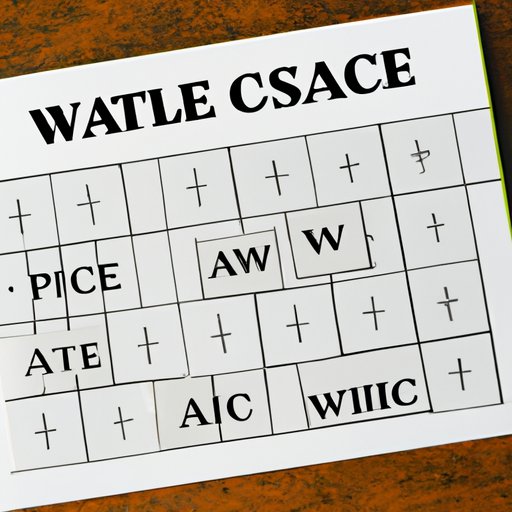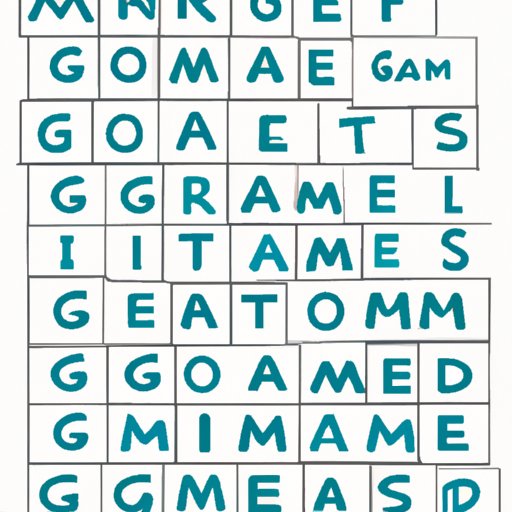Introduction
Have you ever found yourself staring at a jumbled mess of letters, trying to form a word from the chaos? Whether it’s a game, a puzzle, or a random collection of letters, making words from scattered letters can be a challenge—but it’s also an opportunity to exercise your brain and cultivate your language skills. In this article, we’ll explore the process of making words with scattered letters, the benefits of playing word games, and tips for improving your vocabulary through wordplay and puzzles.
Process of Making Words with Scattered Letters
So, how do you make words with scattered letters? Here’s a step-by-step guide:
- Study the letters carefully and identify any familiar patterns or combinations.
- Start by forming short, simple words that you recognize.
- Look for prefixes and suffixes that can be added to existing words to create new ones (e.g. “re” or “ing”).
- Try swapping out individual letters to see if you can create new words (e.g. “cat” becomes “bat”).
- Experiment with different combinations and permutations until you’ve exhausted all possibilities.
Here are a few additional techniques that can help you maximize your word creation:
- Use a pen and paper to write down all the words you come up with, so you can keep track of what you’ve tried.
- Think creatively and don’t be afraid to try unusual combinations of letters.
- Use online word databases or apps to check if certain words are valid and to discover new words you may not have thought of.
Here are some examples of words you can make from scrambled letters:
- SHORLE = “Horse”, “Shore”, “Roles”, “Holes”, “She”, “Hero”, “Rose”, “Sore”, “Los”, “Or”, “So”
- RAOPN = “Apron”, “Roan”, “Pan”, “Pro”, “Rap”, “Nap”, “Nor”, “On”, “No”, “Or”
- TISAR = “Stair”, “Rats”, “Star”, “Tar”, “Art”, “Sir”, “Sit”, “Its”, “Is”, “At”, “As”
Word Games for All Ages: Making Words with Scattered Letters
Word games are a fun and engaging way to build vocabulary, improve spelling, and enhance cognitive function. Here are some popular and enjoyable word games you can play alone or with friends:
Scrabble
Scrabble is a classic game that challenges players to create words from a collection of letter tiles. Each tile has a different point value based on how common the letter is, and players get points for each word they create on the game board. Scrabble is a great way to improve your vocabulary and strategic thinking skills, as well as bond with family and friends.
Boggle
Boggle is a fast-paced and addictive game that involves shaking a tray of letter cubes and then forming as many words as possible within a set time limit. Boggle requires quick thinking, word recognition, and the ability to spot patterns and connections between letters. It’s a great game for solo play or with a group.
Word Search
Word search puzzles involve finding hidden words within a grid of letters. The words can be arranged vertically, horizontally, diagonally, forwards, or backwards, and can be themed around different topics like animals, sports, or holidays. Word search puzzles help improve pattern recognition, visual attention, and memory skills.
From Anagrams to New Vocabulary: What You Can Learn from Making Words with Letters
The process of making words with scattered letters isn’t just a fun and engaging activity—it can also help build your vocabulary and improve your language skills. One way to expand your vocabulary is by playing with anagrams, which are words or phrases formed by rearranging the letters of another word or phrase.
For example, the word “listen” can be rearranged to form the word “silent,” or the phrase “decimal point.” Anagrams can help improve your vocabulary by encouraging you to recognize patterns and connections between words, as well as by teaching you new words and their definitions.

How to Ace Word Puzzles: Tips for Making Words with Any Combination of Letters
Word puzzles and brain teasers come in many shapes and sizes, from crossword puzzles to cryptograms to word ladders. One common type of word puzzle involves taking a set of scrambled letters and forming as many words as possible within a set time limit or with a certain difficulty level. Here are some tips for solving word puzzles like a pro:
- Start with the vowels: A, E, I, O, and U. These are the most common letters in the English language and can help you form the foundation for many words.
- Look for prefixes and suffixes that can be added to existing words to create new ones.
- Try to think of words that relate to the given theme or context of the puzzle.
- Use your knowledge of the English language to make educated guesses about which combinations of letters are likely to form words.
- Don’t get bogged down by individual letters—try to think of letter combinations and syllables that can create words.
Here’s an example of a word puzzle and how you could solve it:
Using the tips above, you might come up with words like “fog,” “fig,” “off,” “gin,” “ion,” and “nog.” You can also use online word databases or apps to check if certain words are valid and to discover new words you may not have thought of.
The Art of Wordplay: Using Scrabble Tiles to Create Words You Never Knew You Needed
Scrabble is a great game for building vocabulary, but it can also be a fun and creative outlet for making up new words. In official Scrabble tournaments, players are not allowed to use made-up words, but in casual play with friends or family, you can experiment with using unusual letter combinations to see what words you can create.
Here are a few strategies for making up new words in Scrabble:
- Try adding prefixes or suffixes to existing words (e.g. “un-“, “pre-“, “-ness”).
- Combine two unrelated words into a new, hyphenated word (e.g. “brain-sweet” or “beach-tower”).
- Use uncommon letter combinations that are technically valid but rarely used (e.g. “QI” or “ZA”).
- Play a word that’s not in the dictionary but sounds plausible (e.g. “flibbertigibbet” or “snollygoster”).
It’s important to note that not all made-up words will be accepted in official Scrabble play, so it’s important to check the official Scrabble dictionary for each word you create.
Brain Teasers for Wordsmiths: Challenging Yourself to Make Words from Random Letters
If you’re looking for a unique challenge, try taking on a word challenge where you have to make up words from a particular set of letters. Here’s a list of letters to use and some suggestions for how to get started:
- Challenge yourself to create as many words as possible using only these letters.
- Try to create words that relate to a common theme or subject (e.g. animals, colors, or emotions).
- Use online word databases or apps to discover new words that you may not have thought of.
- Focus on unusual combinations of letters to see what words you can come up with.
Conclusion
Making words with scattered letters can be challenging, but it’s also a rewarding way to exercise your brain and improve your language skills. We’ve explored different techniques for creating words from random letters, the benefits of playing word games, and strategies for improving vocabulary through wordplay and puzzles. With practice and persistence, you can become a master wordsmith and have fun while doing it. So, the next time you come across a jumble of letters, don’t be intimidated—see it as an opportunity to flex your linguistic muscles and discover new words.
Now it’s your turn.
